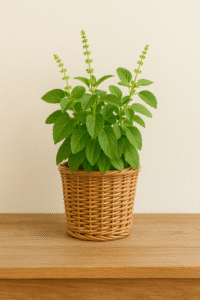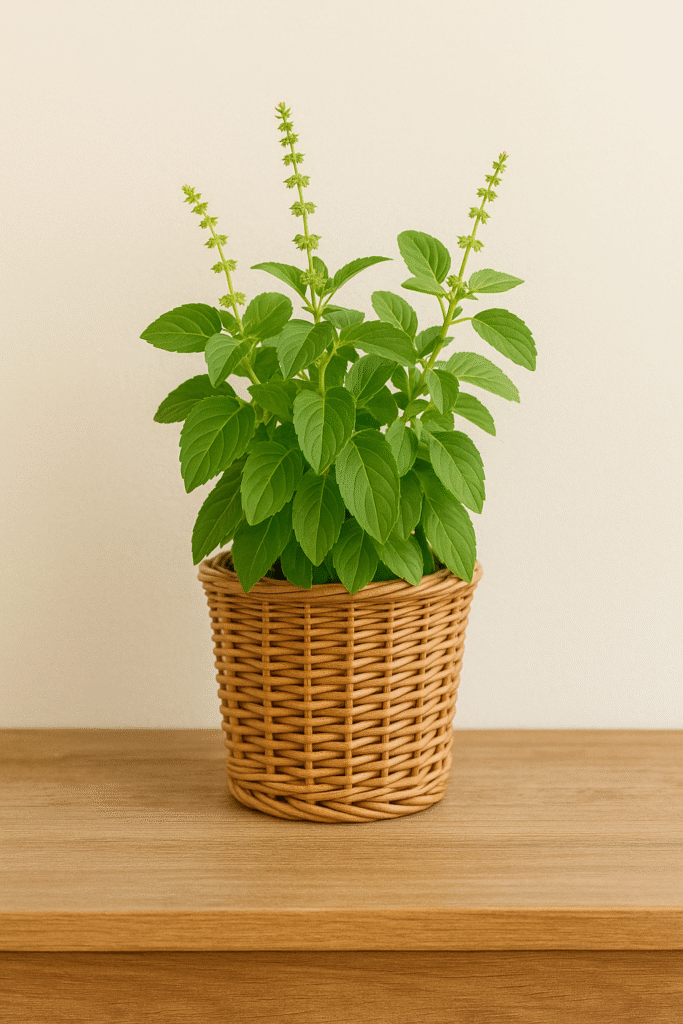Brazilian basil, also known as alfavaca in Portuguese, is one of the most cherished plants in Brazilian home gardens and kitchens. With a strong fragrance and proven medicinal properties, this herb goes far beyond culinary uses. It carries cultural, spiritual, and healing significance that spans generations.
In this article, we’ll explore the main benefits, culinary uses, medicinal properties, and spiritual meaning of Brazilian basil, as well as practical growing tips for those who want to keep this special plant at home.
What is Brazilian basil?
Although there are many varieties of basil (like sweet basil, Thai basil, and purple basil), Brazilian basil or clove basil (Ocimum gratissimum) is widely grown in Brazil, especially in the North and Northeast regions.
It is known for its strong clove-like aroma, with broad, serrated leaves and small white to pale lilac flowers that grow in spikes. The scent is much more intense than that of common basil (Ocimum basilicum), making it both powerful and unique.
Culinary uses of Brazilian basil
While sweet basil is more common in international dishes like Italian pasta or pesto, Brazilian basil plays an important role in regional Brazilian cuisine, especially in traditional recipes from Bahia and neighboring states.
It is commonly used to season:
-
Moquecas (fish stews);
-
Spicy beans and rice;
-
Acarajé and vatapá (Bahian street foods);
-
Savory farofa (toasted cassava flour side dish);
-
Homemade sauces and marinades.
Its flavor is stronger and more peppery than sweet basil, so it’s best used in small amounts to avoid overpowering the dish. It’s also popular for making digestive teas after heavy meals.
Medicinal benefits of Brazilian basil
For centuries, Brazilian basil has been valued as a medicinal herb in folk medicine. Its leaves contain essential oils like eugenol (also found in cloves), which provide:
-
Antiseptic properties;
-
Anti-inflammatory action;
-
Digestive support;
-
Expectorant effects for respiratory relief;
-
Mild sedative properties.
Some of the most common uses include:
-
Tea for colds, coughs, and bronchitis;
-
Infusions for headaches and menstrual cramps;
-
Relaxing herbal baths for stress and insomnia;
-
Poultices for bug bites and minor wounds.
Its aroma alone is believed to promote calmness and balance, making it a favorite in many traditional remedies.
Spiritual and cultural importance
In Afro-Brazilian religions like Candomblé and Umbanda, alfavaca is considered a sacred plant. It is used in spiritual baths, purification rituals, and house cleansing ceremonies. Sprinkling cooled basil tea around the home is believed to ward off negative energy.
For many families, keeping a basil plant at home isn’t just a habit — it’s a symbol of protection and positive energy.
How to grow Brazilian basil at home
One of the best things about Brazilian basil is how easy it is to grow. Whether you live in a house with a garden or in an apartment with a sunny balcony, you can enjoy this herb year-round.
Growing tips:
-
Sunlight: Needs at least 4–6 hours of direct sunlight daily;
-
Soil: Prefers loose, well-draining soil;
-
Watering: Keep the soil moist but not soggy;
-
Pruning: Regular trimming encourages bushy growth and prevents flowering;
-
Harvesting: Pick mature leaves regularly to stimulate new shoots.
Propagation can be done by seeds or cuttings (simply place a healthy stem in water until it roots). For elegant and practical touch, try growing your basil in glass propagation stations that double as wall decor.

🌿 Add green elegance to your home or office!
XXXFLOWER Wall-Mounted Propagation Station with Wooden Stand, 5 Glass Test Tubes, 3-Tier Hanging Planters, Perfect for Herb Cuttings and Indoor Terrariums. Beautifully designed for growing Brazilian basil and more!
🌿 Cumaru: The Amazon’s Aromatic Treasure
Known as Tonka Beans, Cumaru has been treasured for centuries in the Amazon
for its unique fragrance and powerful traditional uses.
Discover why this exotic seed is considered a natural gem worldwide!

